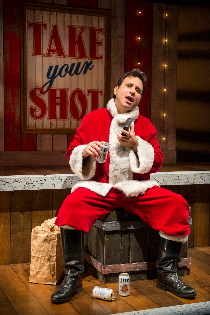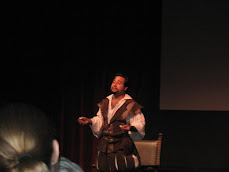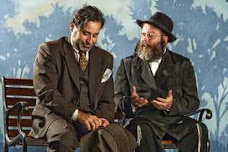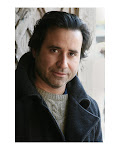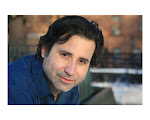By Ron Levitt
Florida Media News
2, It is – in Broadway terminology – a musical with music and lyrics by Stephen Sondheim and book by John Weidman, based on an idea by Charles Gilbert, which uses the premise of a murderous carnival game to produce a revue-style portrayal of men and women who attempted (successfully or not) to assassinate Presidents of the United States. The music varies to reflect the popular music of the era as depicted.
3. This particular production, so brilliantly directed by the multi-talented Stuart Meltzer , is a showcase of young South Florida theatrical talent rarely seen in the same show. By all counts, there are a dozen men and women -playing -mostly unsavory characters who left their mark on U.S. history only because of their hateful action.
The musical first opened Off-Broadway in 1990, and the 2004 Broadway production won five Tony Awards. It is by any standard a totally different kind of musical. Except for the closing reprise Everybody’s Got the Right, one does not come out humming one of the show’s songs, even though the ballads are of historical elements and are noteworthy for their Americana interpretations and liberal philosophical lyrics. Nevertheless, it is such an original musical – much in the style of Sondheim’s Sweeney Todd – it is hard to forego its message emblazoned on a carnival flipboard in this production –Take Your Shot.
Assassins begins as the Proprietor of the game (a noteworthy Shane Tanner) entices a host of unsavory characters to play, promising that their problems will be solved by killing a President. ( that’s when "Everybody’s Got the Right" comes in) . Leon Czolgosz, John Hinckley, Charles Guiteau, Giuseppe Zangara, Samuel Byck, Lynette "Squeaky" Fromme, and Sara Jane Moore are given their guns one by one. John Wilkes Booth (a vibrant portrayal by the talented Nicholas Richberg) enters last and the Proprietor introduces him to the others as their pioneer before he begins distributing ammunition. The assassins take aim as "Hail to the Chief" heralds Abraham Lincoln's offstage arrival. Booth excuses himself, a shot rings out and Booth shouts, "Sic semper tyrannis!"
Nick Duckart’s interpretation of Czolgosz (who killed President McKinley) is a constant in this production, as are Irene Adjan and Lindsey Forgey who have spectacular moments as would-be killers Sara Jane Moore and Squeaky Fromme ( both after Gerald Ford) respectively (but not respectfully).
Chris Crawford – fresh off his successful Florida debut in Palm Beach Dramaworks’ Carbonell-nominee The Lion in Winter) comes on as a South Florida wannabe star in his double role as the Balladeer and Oswald (who left his mark on the death of President John F. Kennedy) Henry Gainza, Chaz Mena and Gabriel Zenone also all shine as actors playing real-time gun-obsessed characters one would hopefully forget!
Assassins is three year old Zoetic’s first musical and puts it on par with several other companies musically inclined. When you Google Assassins – and, well you should – you will discover you can see the entire show on a DVD and that there is even an online action game so entitled to give one the thrill of being part of similar action -behind all the carnage and mayhem which the title implies. Although it is set in another century, it implies we all have the same DNA to execute the carnage as echoed in this production.
Florida Media News
MIAMI -- Assassins, the politically incorrect Zoetic Stage musical which opened at the Arsht Center’s blackbox Carnival stage Friday night,scores as a winner on several levels:
1.It is a lesson in democracy and a rebuttal to the National Rifle Association regarding the use of firearms. If anyone seeing this show doesn’t envision the need for gun control, he or she must have been seeing another show or wearing heavy earmuffs.
2, It is – in Broadway terminology – a musical with music and lyrics by Stephen Sondheim and book by John Weidman, based on an idea by Charles Gilbert, which uses the premise of a murderous carnival game to produce a revue-style portrayal of men and women who attempted (successfully or not) to assassinate Presidents of the United States. The music varies to reflect the popular music of the era as depicted.
3. This particular production, so brilliantly directed by the multi-talented Stuart Meltzer , is a showcase of young South Florida theatrical talent rarely seen in the same show. By all counts, there are a dozen men and women -playing -mostly unsavory characters who left their mark on U.S. history only because of their hateful action.
The musical first opened Off-Broadway in 1990, and the 2004 Broadway production won five Tony Awards. It is by any standard a totally different kind of musical. Except for the closing reprise Everybody’s Got the Right, one does not come out humming one of the show’s songs, even though the ballads are of historical elements and are noteworthy for their Americana interpretations and liberal philosophical lyrics. Nevertheless, it is such an original musical – much in the style of Sondheim’s Sweeney Todd – it is hard to forego its message emblazoned on a carnival flipboard in this production –Take Your Shot.
Assassins begins as the Proprietor of the game (a noteworthy Shane Tanner) entices a host of unsavory characters to play, promising that their problems will be solved by killing a President. ( that’s when "Everybody’s Got the Right" comes in) . Leon Czolgosz, John Hinckley, Charles Guiteau, Giuseppe Zangara, Samuel Byck, Lynette "Squeaky" Fromme, and Sara Jane Moore are given their guns one by one. John Wilkes Booth (a vibrant portrayal by the talented Nicholas Richberg) enters last and the Proprietor introduces him to the others as their pioneer before he begins distributing ammunition. The assassins take aim as "Hail to the Chief" heralds Abraham Lincoln's offstage arrival. Booth excuses himself, a shot rings out and Booth shouts, "Sic semper tyrannis!"
Meanwhile, The Balladeer (a memorable Chris Crawford) portrays the personification of the American Dream -- as well as Lee Harvey Oswald ) as a host of characters are unveiled whose claim to fame is their firearm attack on a President.
There are so many memorable moments and star-quality actors participating in this musical, one can easily be distracted recalling a school history lesson when a teacher named a President and the assassin who either tried to kill or did assassinate one of our country’s leaders.
Among the standout performances (including Balladeer Tanner) are Nick Duckart, Clay Cartland, Gabriel Zenone, Henry Gainza, Chaz Mena, Lindsey Forgey, Irene Adjan, Nicholas Richberg, Chris Crawford and ensemble members Kristian Bikic, and Stephanie White.
It is the kind if show with so many standout moments, one would have to rewrite history to describe Assassins in full. Cartland’s describing a John Hinkley and his obsession with Jody Foster (and his attempt to impress her by attempting to kill Ronald Reagan) while strumming his guitar is such a moment!
Nick Duckart’s interpretation of Czolgosz (who killed President McKinley) is a constant in this production, as are Irene Adjan and Lindsey Forgey who have spectacular moments as would-be killers Sara Jane Moore and Squeaky Fromme ( both after Gerald Ford) respectively (but not respectfully).
Chris Crawford – fresh off his successful Florida debut in Palm Beach Dramaworks’ Carbonell-nominee The Lion in Winter) comes on as a South Florida wannabe star in his double role as the Balladeer and Oswald (who left his mark on the death of President John F. Kennedy) Henry Gainza, Chaz Mena and Gabriel Zenone also all shine as actors playing real-time gun-obsessed characters one would hopefully forget!
Assassins is three year old Zoetic’s first musical and puts it on par with several other companies musically inclined. When you Google Assassins – and, well you should – you will discover you can see the entire show on a DVD and that there is even an online action game so entitled to give one the thrill of being part of similar action -behind all the carnage and mayhem which the title implies. Although it is set in another century, it implies we all have the same DNA to execute the carnage as echoed in this production.

